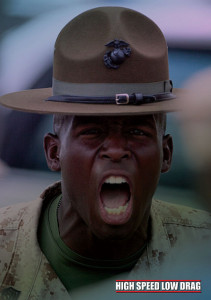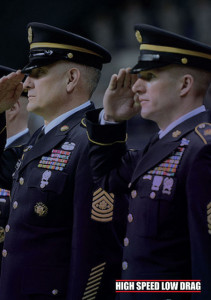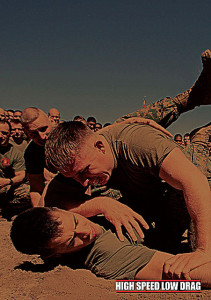 This post is based on the video -?Six Bad Military Habits | How To Get Rid Of Unwanted Habits And Change For The Better
This post is based on the video -?Six Bad Military Habits | How To Get Rid Of Unwanted Habits And Change For The Better
Hi. I’m Antonio Centeno and I am one of the founders of High Speed Low Drag.
Today I’m going to be talking about the six bad habits that most likely you picked up in the military and how to get rid of them.
Now, a little bit about me. I did serve in the United States Marine Corps from about 1997 to what was asked when I went through OCS, and then I got out at the end of 2003 after a fun little trip over to Iraq.
I would have to say I wrote these six things down. I was talking with John Lee Dumas of Entrepreneur on Fire. He was in the army as well.
We both agree that we see a lot of guys getting out and I had a number of these habits. In fact, I still say “friggin'” sometimes and these other words where I think civilians look at me, people look at me and they’re like, “What did he mean by that?”
The thing is these six bad habits, the reason I’m bringing them up is because you need to be aware of them. Hopefully, you can start to make change.
If you decide not to make the change, well, then you just realize that these things could possibly be holding you back. It’s more of awareness than you saying you have to go back in and change the way you talk or stop following orders or you’ve got to change the way that you manage.
“That’s my style. I’m not going to change.” Guys, I simply want to make you aware and, in my opinion, it is something I have seen hold people back.
 Number one, the first thing is language.
Number one, the first thing is language.
Now, there’re a few things with this: one, is that sometimes we have the mouth of a sailor. Nothing against all you guys that served in the Navy but you’ve heard that out there. When you’re on a boat with a whole bunch of other guys, at least ? I was with an infantry battalion so there weren’t too many ladies on the boat with us.
There were a few. That’s a whole another story but let’s just say that even the ladies that we were with, we all developed I think a little bit ? we were very short. Deployed for six months, even longer, and you’re just very curt and you’re very direct. We liked to throw in these adjectives like “friggin'” and, well, I’m not going to go down this too much but let’s just say that you need to be careful of that especially when you first get out.
If you’re finding that you’re reverting to coming up with adjectives like that, I would say find a way to replace them. If you want to get serious in business, start to read business books. Pick up that type of jargon and that’s going to help you because you need to redevelop your vocabulary.
Another point is acronyms. So MREs; MEU, I’m going to go on a MEU; or a WESTPAC. All of these things that roll off our tongue, we need to understand that most people, especially in an interview, if you’re saying things like this, they’ll have no idea what you’re saying. You’ve got to better translate your skill set into civilian terms.
If you’re going to say, “Oh, I went on WESTPAC and we did this after deployment,” they’ll just go look at you. They’re not going to interrupt but they’re going to wonder what in the world is that? So you’re going to want to explain in civilian terms that for a six-month period I worked with these specialized units. We came together. We traveled to Hawaii, Singapore, down to Australia, and then over to the Middle East. In the country of Kuwait?
I mean, be very specific. You can paint a story with it but be careful of those acronyms and don’t throw in any of that foul language. So that’s number one. Again, guys, I support this with an article over at High Speed Low Drag. Go check out that article, over 2,000 words long, go into a lot more detail.
 Point number two is following orders.
Point number two is following orders.
In the military, especially officers, we’re taught how to properly explain orders, how to give them, how to accept them. You can get discharged. You can go to the brig if you do not follow orders. So it’s something that we do. We try to follow orders.
On the enlisted side, I mean, you go through boot camp. Boot camp is about breaking you down and teaching you that following orders without question in a very short amount of time is important sometimes because you don’t want to be questioning if your staff sergeant’s telling you to fire in a certain direction. No. You don’t question. You immediately fire because there is not time to react.
In the civilian world that changes. One of the big things is you got a great gunner; you had a great staff sergeant. He really, when it comes down to it, he’s looking out for you. He wants to make sure that you survive. When it comes in the civilian world, especially with some of these companies, they’ve got internal politics and you need to look at the bigger picture and why are you doing. Don’t just accept orders especially when you get multiple bosses.
Usually, we have a chain of command in the military. We had one in the Marine Corps. You’re not always going to see that chain of command. It’s not as clear in the civilian world and you need to be questioning orders. You need to look at whose interests are at play here and understand that following orders can get you in trouble.
Point number three, reliance on institutional support.
In the Marine Corps, you had the base, you had the PX, you had all of these great things. We had a great medical system supported by the Navy. Thank you. We had just all of these ? and when you’re deployed, if you’re with the MEU, you’ve got the air unit, you’ve got the ground unit, you’ve got the Navy right there getting you from point to point.
You’re a cog in a system and it feels good because you can specialize and you can make that happen. The problem is when you get into the civilian world, it’s chaos. There isn’t that system. There’re all these new terms. Even healthcare, that’s a huge debacle. It’s very difficult to figure out. Even the healthcare professionals have trouble figuring this out so you need to understand that it’s okay. Chaos is something you’re going to see a lot in the civilian world but you need to create your own order. So when it comes to budgeting, you need to ?
When you were in the military, you had a larger discretionary income. Usually, your food was going to be taken care of, your housing if you are on base, your healthcare ? all these things were taken care of so the money you were paid actually you could spend a lot more of it. You’re going to have to budget. You’re going to take care of your own insurance.
Health, life, disability ? all of these things you need to be watching for. You need to be saving for yourself. I mean, yeah, there’s social security and some companies have 401Ks but if you start your own business, you’re going to have to budge for all these things. It’s also on you to find the Best Business Contents Insurance.
When you buy your first house or you have an apartment, you’re going to have to have a rainy day fund for when the roof caves in or needs replacing. Stuff’s expensive and these are things maybe for 20 years you haven’t had to think about but you’re going to need to make time for it now.
 Number four is an expectation of respect.
Number four is an expectation of respect.
I was a captain. I put on those captain bars, guess what?
I’m given instant respect from people I don’t even know. Simply, they see the bars, I get a salute, I salute back. In the civilian world, there is a system and those bars don’t exist but what exists is the way that people dress and the way they talk, the way they present themselves — difference between someone calling you, “Hey, man” or “Sir.” So understand that you want to always put your best foot forward because you want to be treated as someone with higher respect.
However, just because you were a captain or a lieutenant colonel or a sergeant major, when you get out, people are not going to know that.
They’re not even going to know the difference between a sergeant major and a gunnery sergeant or, in some cases, a corporal. I mean, they know you’re different ages but they don’t realize how hard you worked and everything that you went through.
So you’re thinking, “Okay. I’m a three-time deployed vet. I should be given a bit of respect and a bit of responsibility.” You join a company and you find that you’re reporting to a guy that’s 20 years your junior and you have no one under you and you’re being expected to do tasks. You’re being micromanaged as to how to sharpen a pencil. That kind of stuff is frustrating.
So you’re going to have to realize that in the civilian world you’re going to have to earn respect and you’re going to have to find alternative ways. It’s not about rank but it’s about, in a sense, what you do, who you work with, and you’ve got to build that respect back up. It takes a while and you have to swallow a bit of pride but, guys, you can very quickly go into a company and move your way up and earn the respect again.
Treatment of subordinates, number five.
If I gave someone something to do, it was just going to be done. There was no question. If I gave my staff sergeant — who was an amazing staff sergeant by the way. If I gave him something to do, he would have signed it out but I knew Staff Sergeant Garcia will make things happen.
I find that a number of people I’m working with, it doesn’t always happen that way especially if they don’t report to you. Or if you’re having to work with them on a team, you may ask them to do something.
They’ll say they’re going to do it and all of a sudden, boom, it doesn’t happen. Technically, this person is a lower place in the company than you, but you can’t just yell at them. You can’t or you’d get fired if you do that. You can’t just instruct them.
You got to be careful. I came from an infantry battalion where we didn’t work with women. I can tell you, one of my first female employees, I made her cry. I just didn’t know how to work with women and I’m very direct and it didn’t go over well. You have to learn that there’s a lot more in play and that you can’t treat people if you were pretty rough.
I have to admit I wasn’t probably the best manager. I definitely had some rough edges. You’re going to have to go back to school in terms of learning modern management technique and how to work with people, how to negotiate, how to clearly express what you need done and the deadlines that you need done and to make sure they understand. It’s a lot more I would say, almost political; it’s a lot more murky gray area but you’re going to have to find a way to make it work.
 The last point, number six, is a reliance on unit PT.
The last point, number six, is a reliance on unit PT.
My staff sergeant would take the whole unit out and he’d run us through a PT. It was cool. Every single day, you had an hour.
It was dedicated to keeping your body in shape. You don’t find that time. Most companies do not ? I mean, they’ll maybe pay for a gym membership but they’re not going to say that you need to get there. But your body is so important to why how this works up here. You’ve got to continue to take part of it.
Another thing, most of us didn’t learn this in the military. They never talked about this. Maybe in the Air Force they did but in the Marine Corps they didn’t. They never talked about the importance of nutrition and what you put into your body.
Guys, I would see guys in the Marine Corps just eating McDonald’s all the time, drinking coffee, donuts.
No. You need to take care of your body.
Go check out my friend, Ryan Masters, over at A Spartan Rises. He has a free program for nine weeks but a huge part of the program is what you put into your body; in addition, setting up the habit of going to the gym. Rethink: just because you built up into a huge mass on a boat for six months doesn’t mean that you actually know exactly how to bench press correctly, that you know how to squat correctly.
So go back, make sure you relearn the fundamentals. Really go with an open mind. I talk about this in another video but have an open mind to ways that you can improve yourself and that is going to help you overcome these six bad habits.
Gentlemen, hopefully you enjoyed this. If you want to learn more, go to highspeedlowdrag.com and check out our high level Mastermind program, High Speed Elite. I’d love to have you in it. Take care. Bye-bye.
